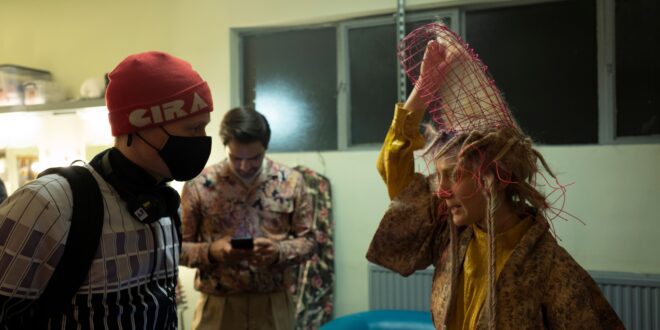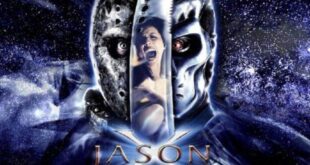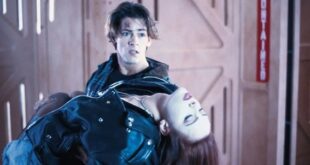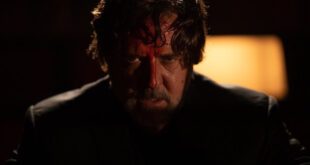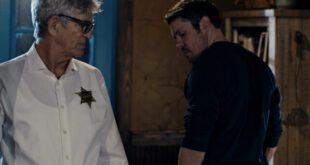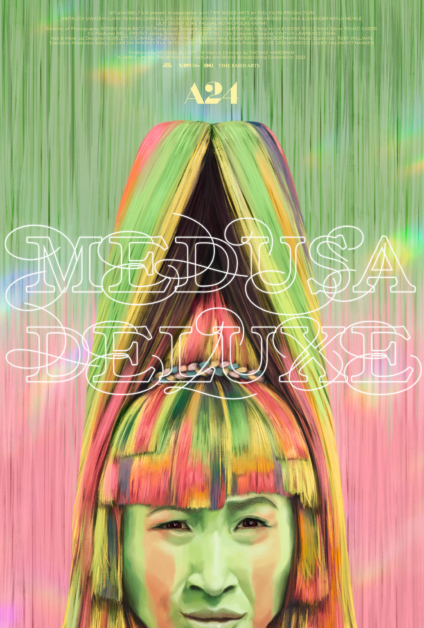
Note: This piece was written during the 2023 WGA and SGA-AFTRA strikes. Without the labor of the writers and actors currently on strike, Medusa Deluxe being covered here wouldn’t exist.
PopHorror: I finished up Medusa Deluxe last night, and I really enjoyed it! I was very impressed by the whole one-take decision.
Thomas Hardiman: Oh, thanks, Chris. That’s nice. Yeah, happy you liked it.
PopHorror: I wanted to ask you about that in particular. What made you decide to do it, to portray it, in a one-take style?
Thomas Hardiman: Yeah, of course. I mean, there’s obviously always multifaceted different reasons why you do things, but for me, it’s about I won’t get too far down in the weeds, but I’m actually thinking a lot about how the internet has changed writing and media consumption. I was aware that other one-shot films existed, but people start to view these things as just as “Oh, it’s just long takes, one shots,” and it almost becomes dismissive. But for me, I think it’s more interesting than that. I feel like we’re at a point where how we consume media has started to change. I was quite inspired by my nieces who were looking at long YouTube videos of hair and makeup tutorials and they’ll very happily watch an hour of a random teenage girl in her room just talking at her webcam. And I was thinking to myself that’s a pretty radically different way of kind of inhabiting life with a camera, and the same with an iPhone, same with what we’re doing on Zoom. Just speaking to someone through a lens has changed in the last ten years. And I think as a storyteller and a filmmaker, it gives you opportunities. So with something like a murder mystery, it allows you to stay with people beyond the point of your red herring or clues and starts to change what the film is. It becomes a character led drama. You’re with these people beyond that moment that you would traditionally cut away from them. And I find that it suddenly allows you space to make a film that’s pushing at the seams of what a genre, almost what a film necessarily can be. And to me, that’s what I find exciting. Like I love ensemble dramas. I love ensemble comedies like Nashville. These films are huge for me. So to take this kind of filmmaking in that direction, yeah, that’s why I wrote the film, it’s why I was excited to make it.
PopHorror: Well, I can absolutely see that character ensemble. The film truly felt like one and your use of the one-shot and the camera both really got you in close and gave you that sense of confined space with all of them.
Thomas Hardiman: Oh, great. Yeah, that was it exactly. I want to throw people in the moment. I want to kind of get people right close to the action, essentially. It’s basically just inhabiting space with people, and it’s treating the camera in a different way. And it’s funny because, yes, it’s new technology, in a sense, and it’s a different way of working with cameras and people at the same time. It builds on the classic tenets of filmmaking. I was actually just talking about 12 Angry Men, where famously that camera is in one room. So to make it feel different during the film, it goes from high at the beginning to head height during the second section, and then it goes below during the third section to kind of increase the claustrophobia. And that’s exactly what we’re doing. We’re working on the exact same sort of thing. We can just do it quicker, and we can do it in different ways. And, yeah, you’re sort of thankful to the whole history of directing out there that gives you these opportunities to build on what they’ve done. At the same time, you’re thankful to modern technology to allow you to push it even further.

PopHorror: Oh, absolutely. Paying reverence to the history while pushing towards the future.
Thomas Hardiman: Yeah, it’s exactly that. Like, Hitchcock is a massive part of this film, as there’s about four or five shots taken directly from Hitchcock films. Big inspiration, obviously. And yeah, it’s pretty cool to see what they were doing and how that can kind of inspire modern filmmakers.
PopHorror: I wanted to ask, on the technical end, what were probably the biggest challenges in accomplishing that?
Thomas Hardiman: We shot the whole film in nine days, so that’s like a very small time to shoot any film. I think every challenge was so vast because obviously, it’s a small budget British film, essentially. It’s ambitious and it’s kind of like you would never necessarily sit there going, “Oh, right, this is a ragtag bunch up in a place called Preston trying to make a film,” at the same time. To pull that off, it kind of means that every challenge is so vast it becomes this gigantic shadow until you get to the end of it. There are shots in there where the camera effectively flies from the ground to 60 feet up in the air and all those things connecting those. Yeah, you’re just incredibly thankful to all the people that made it possible because it’s incredibly complicated and ambitious.
PopHorror: Oh, fully agree. (chuckling) Another reason I’m grateful the camera’s not on me, is because my eyes bugged out a little when you said you shot all that in nine days.
Thomas Hardiman: It’s mental when I look back on it. I do kind of go, wow, we were crazy. But now I’m also kind of… I don’t know, you just do it like when you’re there, you’ve got the love, the energy, and it’s the biggest… Y’know, I’ve never had the chance to make a film before. This is the biggest opportunity of my life, and I just knew that’s the only way we could make something like this. We had a lot of different things making it, forcing it into that kind of time frame, and you just do it, and then you turn around to everyone who’s kind enough to support you, and “Thank you” are basically the only words. You’ve got an incredible cast who are kind of giving everything they’ve got, an incredible kind of crew who are pulling out all the stops, really, to give you shots that make people say wow. I want people to be thrown into a new world and just have that kind of whirlwind experience where it’s like an avalanche. Like, you are a little tiny snowflake at the top of the hill to start with, and you’re rolling… What’s the word? Surfing the avalanche by the end of it.
PopHorror: You certainly gave me a couple of those wow moments. I definitely picked up on a lot of those, like, Vertigo, Rear Window type Hitchcock shots. But then when you did that rising crane shot you just mentioned? That was a wow moment for me, because I don’t know what sort of technical wizardry you had to do to pull that off and make it so seamless.
Thomas Hardiman: Yeah, I would have said that was a nerve-wracking moment. That was not the easiest shot. But really, I feel like I’m interested in shots the eye can’t see. When I was, I guess, coming through and making short films, taking any opportunity I could to make something, I was thinking a lot about bird’s eye views, actually. I was thinking to myself that a human eye, it’s very rare that we look directly down on something until we started building these huge buildings and having planes that could see down that way. And then it sort of set me on a world of going, “What else can the eye not see that a camera can?” I shot a shot once that was actually seeing above and below the water at the same time, shot with two cameras. Then we put the two shots together on the line of the water. And I’m always trying to work out what way you can take a camera to have those moments that suddenly just take you into a space of going somewhere you haven’t seen before. And sometimes it can just be as simple as motion. Sometimes it can be as simple as a camera orbiting a space for a prolonged period of time. It doesn’t always have to be kind of ingenuitive in the same way as seeing above and below water. But that’s actually something that excites me in terms of filmmaking. I do sit around and think about it. I’m the kind of geeky who does sit around and think about these kinds of things.
PopHorror: Yeah, but we need the geeky guys. Film is a visual storytelling medium, and we need that intriguing, interesting new way to show off the medium.
Thomas Hardiman: Talking about Hitchcock actually, just coincidentally I recently watched his first sound film, which is like 1931? It’s called Blackmail. And he actually shot it as a silent film and went back and reshot sections of it with sound. So it was famously the first British sound film. And it’s very funny because there’s a section of this film where it’s two people walking up five flights of stairs. And if you write that scene, it’s literally “people walk upstairs.” It’s literally like a line. And he’s obviously looked at that line and thought, okay, how can I make this the best staircase shot you have ever seen in your life? And also make it function in terms of adding tension to the film. And so he must have said to his art department, his producers or whatever, “I need to you to build me five flights of stairs, and I’m going to rise the camera from the floor to the ceiling.” And honestly, it’s remarkable. The shot is absolutely incredible, the fact that everything in that film is basically filmed on location, aside from interiors. But he’s said to someone, for like a 20 second shot, “I need you to build this ginormous set.” Like, it must have been huge. And I was just there in awe, sawing, that’s it. And also, another one is Witness, you know, the Harrison Ford film from ’85, maybe?
PopHorror: Yeah, that sounds right, 1985 or ’86.
Thomas Hardiman: There’s a sequence in that where it’s like the Amish community that he’s living with, they build this building. And apparently that scene was two lines in the script saying they have lunch or something. And Peter Weir was like, “You can’t just have lunch. We need to make that a sequence of the community coming together as one. So we show the tightness of the community.” And to do this he’s got this incredible sequence of a sunset shot where they’re all building this massive house and then they all stop to have lunch. And it’s like one of the standout scenes of the film. And it’s just incredible that you can see, like, two lines of dialogue and see the possibilities in that. Really, it’s a lesson for anyone like me, who’s thinking yeah, there’s gold dust in three lines in a script quite a lot of the time. It’s exciting.
PopHorror: And in what’s usually some of the most boring parts of a script, “Tom and Jane walk down the hallway.”
Thomas Hardiman: Yeah, exactly. I think it’s no coincidence though, is it? Like, I’m not surprised it’s in those parts. With any film, a lot of the time it boils down to a single theme that you’re trying to push. Witness is about community and Blackmail is about, essentially, I would have said it’s about tension. And so in those particular scenes the things that feel the simplest actually boil the film down to its very clear most important component. And I feel like it’s probably not a coincidence, actually, that the filmmakers identify that as the moment to give you that “this is what the film’s doing, this is it’s essential through line”. And I guess for me, with Medusa Deluxe, the film is essentially about a community that is broken apart then comes back together through a shared passion. And that passion is hairdressing. And so the sequences we’re in where we’re orbiting people and hair is sort of taking center stage, specifically a stage with a late sequence in the film, those are pivotal moments. And that’s where the chat kind of dies down and you suddenly go into a purely visual space.
PopHorror: Yeah! Like you say, the stage really is kind of that bring back point at the end and it’s impressive, I actually wanted to ask you about that dance finale.
Thomas Hardiman: Yeah, thanks! Obviously, I guess people are going to be either listening or reading who haven’t necessarily seen the film, so I can’t say everything about it, but…
PopHorror: Exactly why I’m trying to keep it vague (chuckles)
Thomas Hardiman: For me, it’s like, yeah, obviously I want this to be a joyful film. It’s a comedy drama. It’s an absurdist comedy in a lot of senses. And that particular moment is a narrative beat. It’s essentially about one character being brought into the community. And I guess when I’m talking about the passion of the community coming back together, that’s essentially what’s happening with that scene. At the same time, Claire Denis’ a massive filmmaker for me. Beau Travail and I also love quite a lot of Bollywood. So I was trying to work out something that’s the through line, actually through the film in a lot of different ways. But how can you tell a story in a different way, how can you tell it through dance? How can you tell it through hair? There’s a particular character in the film who develops for her hairdressing, and she starts as kind of nervous and by the end she has her moment in the sun. I guess that’s partly her character arc. And you can see it through the hair. Like the quality of her hairdressing is there. It’s on show for the entirety of the film. And those are the questions for me. When you’re doing an ensemble drama, you can’t just tell everybody’s story in the traditional way. You’ve got to figure out new and kind of interesting ways that some will be entirely visual, props, dialogues, you know what I mean? And that’s the joy of it actually. It becomes a puzzle to solve and make sure that you have that emotional connection to every single character.
PopHorror: Oh, yeah. I don’t know how to fully describe it, this may sound silly, but it’s similar to what the opening of the TV series Peacemaker does, where you actually show characterization through the performance of dancing and I thought that was a very nice moment.
Thomas Hardiman: Oh, I’m glad you saw it! That’s exactly it. It was just great to know Simon, the choreographer, was all over it. You know we were trying to work out how you can, exactly as you say, tell character traits through dance? And it’s so fun, isn’t it? You’ve got all these opportunities with film. I think fun is the operative word. I want people to watch this and go, “Yeah, there’s a lot of different things going on.” It is essentially an experimental film at its heart but it’s allowing an audience to kind of come along for the ride. Like, I want people to engage and have fun with it and also enjoy what we’re doing.
PopHorror: And yeah, that word, experimental, may be leery for a lot of mainstream audiences, but I’d say this is definitely a much more approachable experimental film where you can hop in and enjoy the ride.
Thomas Hardiman: Yes, exactly that. I honestly believe it’s perfectly possible to kind of have this modern experience. It’s so like what we live today, just blown apart, like all these different things you experience on a day-to-day basis that the possibility to make films and tell stories in ways that are not traditional at the same time as making them approachable and engaging and audience facing. It’s almost like the first time we’ve been able to do that in cinema. Like I was looking at Barbie, even Oppenheimer. Those films are quite radical in certain ways. They’re not necessarily traditional tentpole summer films. And yet that’s what we want today, isn’t it? Our life experience is just different from what it used to be. We want those films. And it’s kind of a golden age for filmmakers because you’re allowed to do something that is pushing at limits. Films can be radically different to what they were at the same time as being generous to an audience and allowing them to have both bang for their buck, but also wanting them to walk out with a spring in their step.
PopHorror: And a deep personal emotional connection. I only got the chance to see Barbie last weekend. Still yet to see Oppenheimer. But you don’t expect a film about a plastic doll from childhood to be deeply existential and humanistic.
Thomas Hardiman: I mean, it’s remarkable. Like, the writing is outstanding. It’s phenomenal. And just to think that has a blockbuster ever existed quite like Barbie? If you had counter programming previously, the counter programming between male and female audiences, when they’re so crudely divided, it would have been a rom com versus an action film. To have something like Barbie, it’s just a grand film, isn’t it? It’s just interesting. The world is changing so radically and it’s exciting. I was watching it and thinking what an incredible film and how lucky I was to live in a time where it was allowed to be on such a big canvas, to have such a reach and so many people celebrating it. I felt privileged actually.
PopHorror: I don’t want to cut off a wonderful discussion about Barbie, but I just want to make sure we’re promoting your film too. (chuckling) So when can we expect to be seeing your film?
Thomas Hardiman: (Laughing) Yes, right! It’s August 11th. It’s going to be in limited cinemas and VOD release and anyone who takes the time to see it, I’m over the moon. I’m genuinely thankful. I’m actually not in America very often so it’s kind of crazy to be doing these interviews and yeah, I’m excited people have the chance to see it and I’m very thankful.
Medusa Deluxe is released August 11th in a limited theatrical release window and is now available on VOD through Mubi and Vudu.
 PopHorror Let's Get Scared
PopHorror Let's Get Scared
